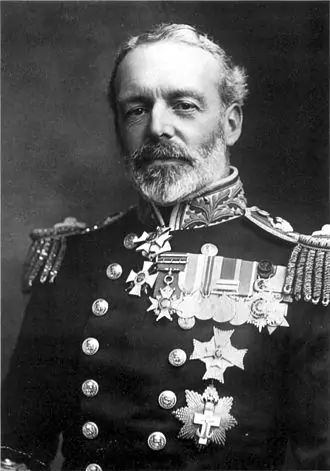
Cradock was born at Hartforth, Richmond, North Yorkshire. After attending Richmond School, he entered the Royal Navy in 1875 he was promoted to rear-admiral in 1910.
With the start of the First World War, in August 1914, Cradock, commanding the 4th Squadron of the Royal Navy and stationed at Stanley, had to deal with Admiral Maximilian von Spee’s East Asia Squadron. Cradock’s fleet was significantly weaker than Spee’s, consisting of mainly elderly vessels manned by largely inexperienced crews. The orders he received from the Admiralty were ambiguous, and Cradock interpreted them as instructing him to seek and engage the enemy forces; clarifying instructions were not issued until 3 November, by which time the battle had already been fought.
Cradock found Spee’s force off Chile in the late afternoon of 1 November, and decided to engage, starting the Battle of Coronel. He tried to close the range to engage immediately, so that the enemy would have the setting sun in their eyes, but von Spee kept the range until dusk, when the British cruisers were silhouetted in the afterglow, while his ships were hidden by darkness. Cradock’s flagship HMS Good Hope and the HMS Monmouth were destroyed with the loss of all 1570 lives, including his own.
A monument to Admiral Cradock was placed in York Minster. There is a monument and a stained glass window in Cradock’s memory in his parish church at Gilling West.
Explore more memories from the ribbon
-
Arthur Dobson
Submitted by Paul Elliott. Many people will, no doubt, have the same experience as myself, in that my grandparents and parents never discussed or talked about their war experiences. Arthur Dobson was a Great Uncle of whom I was totally unaware. He was born in 1896 and lived with his parents, Benjamin and Emily at Commercial Street, Rothwell, Leeds. He was a miner. He joined the Kings Own Yorkshire Light infantry as 37722 Private Dobson and went to France in September 1915 with the 9th Battalion. They were active at the Battle of the Somme and Arthur was posted as missing in September 1916. His parents twice put appeals for information about him in the Yorkshire Evening Post. He was eventually found to have been killed in action on September 16th 1916. He is commemorated on Rothwell war memorial and at Thiepval. He was 20 when he died.
-
Major T E Young
Submitted by Will Young. 1/6th (Perthshire) Battalion, Black Watch (Royal Highlanders) Thomas Young (TEY), my grandfather, was born in 1874 and commissioned into 4th (Volunteer) Battalion, Black Watch in 1898. At the outbreak of the First World War, he commanded “F” (Auchterarder) Company, 1/6th Black Watch, and was mobilised on 5th August 1914 and went with them to their war station which was at North Queensferry on the north side of the River Forth close to the railway bridge. He did not accompany the battalion when it went overseas in May 1915, and until he did go to France he served with one of the reserve battalions at various locations in the UK. TEY re-joined the 1/6th near Arras on 9th July 1916. The battalion went south to the Somme and after their costly attack near High Wood the Officer commanding “C” Company was killed, he took over its command. The 1/6th was withdrawn from the battle area and moved north to Armentieres. They stayed in this area until early October and during this time spent 28 days in the trenches, sometime in a “Rest Camp” and the remainder of the time training or working, and one day at the Divisional Horse Show. The battalion moved back to the Somme and on the 13th November he was wounded at Beaumont Hamel, during the Battle of the Ancre. After treatment in a hospital in France he was evacuated to the UK. He did not return to the front and left the…
-
Henry Tissiman
Carol Sheard of Richmond shared these details with us about her grandfather. Henry Tissiman was born on 10 July 1892. Aged 22, he enlisted on 12th April 1915 at Scarborough as L/12208 Driver H Tissiman with the Royal Field Artillery. He was posted to ‘C’ Battery, 161 Brigade. He went to France on 30th December 1915 from Liverpool and landed at le Havre. He suffered the effects of gas and was briefly hospitalised on 28th February 1916. His service record details that he was granted leave to return home 17th September 1918 until the 1st October during which time he married Emily Guest. This photograph was taken on their wedding day, 21st October 1918. He died on 30th July 1992 at Harrogate.
